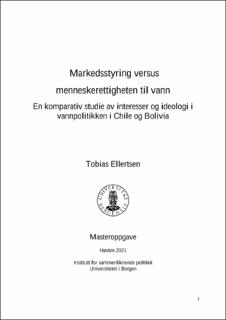| dc.description.abstract | The management of increasingly scarce water resources is a fundamental political question. It revolves around needs, interests, and power, and it's inherently ideological. The aim of this thesis is to better understand why Chile and Bolivia have chosen distinctively different paths when it comes to organizing their water sectors. First, the perspectives of social network analysis are used to identify and organize the actors that have influenced the countries` water sector development. Then, elements from discourse analysis are applied to uncover the interests and ideological positions of the most influential actors in both countries. These analyses find that domestic actors in Chile, equipped with the economic dogma of Milton Freidman, had a lasting effect on Chilean water politics. The same economic models also led to extensive privatization and neoliberal reforms in Bolivia, with heavy influence from international financial institutions. Local community groups then took the country in a completely different direction, not by demanding a human right to water, but by rejecting the neoliberal world views and replacing it with collectivism and indigenous beliefs. | |
